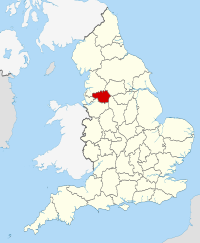 | |
 AGMA's zone of influence in red | |
| Abbreviation | AGMA |
|---|---|
| Formation | 1986 |
| Type | Governmental |
| Purpose | Strategic local governance of Greater Manchester |
| Headquarters | Wigan Investment Centre, Waterside Drive, Wigan |
| Location | |
| Coordinates | 53°32′22″N 2°38′09″W / 53.53950°N 2.63597°W |
Region served | Greater Manchester |
Chair | Peter Smith, Baron Smith of Leigh[1] |
Main organ | Executive Board[2] |
Parent organization | Greater Manchester Combined Authority |
Staff | 0[note 1] |
| Website | www.agma.gov.uk |
The Association of Greater Manchester Authorities (AGMA, 1986-2011) was the local government association for Greater Manchester, a metropolitan county in North West England. Its creation followed the abolition of the Greater Manchester County Council, being established in 1986 as a governmental organisation to represent the ten district councils of Greater Manchester. AGMA was later superseded by the Greater Manchester Combined Authority, the first authority of this new type in the United Kingdom, on 1 April 2011.
The Local Government Act 1985, which abolished the metropolitan county councils of England, included provisions for the district councils in each abolished area in England to vote to establish a county-wide replacement body if they considered this to be the most efficient and effective way of providing certain county-wide services. Greater Manchester was one of a minority of the affected urban areas in England to vote for such a new body under the Act of Parliament. AGMA had a constitution and committee structure, with the leaders of the ten district councils meeting regularly at its head to develop county-wide policies and services.
AGMA was an organisation with "permissive statutory powers", in that seven or more of the ten district councils had to formally vote it into existence, but once established it had delegated statutory powers, staff and budgets and as such AGMA developed policy, lobbied government and others, and ran a range of services designed to make strategic and tangible advances in the standards of living across Greater Manchester.
The Executive Board of AGMA was composed of representatives from Greater Manchester's ten metropolitan boroughs, and the Greater Manchester Integrated Transport Authority, the Greater Manchester Police Authority, the Greater Manchester Fire and Civil Defence Authority and the Greater Manchester Waste Disposal Authority, who were all members by subscription.[2] The local authorities of Blackpool, Blackburn with Darwen, Cheshire East and Warrington were associate members with representation at AGMA debates and meetings, but were excluded from voting processes.[2] AGMA also oversaw the management and policies of the Greater Manchester County Record Office, which preserved an archive with records of the local history of Greater Manchester, now known as "Archives+" and based in Manchester Central Library. The AGMA Policy and Research Unit was based in Wigan.[4]
AGMA also chose to operate a Section 48 Grants Committee, named after the part of the Act of Parliament which permitted a levy on the district councils to fund co-ordinated grants to voluntary organisations which operated across the Greater Manchester area and who might otherwise 'slip through the cracks'. The Greater Manchester Council for Voluntary Service had been instrumental in lobbying to strengthen the powers of Section 48 of the Local Government Act 1985 when it was still being debated as a Bill in the House of Lords.
During its 25 years of operations AGMA made representations on behalf of Greater Manchester to the government of the United Kingdom, the North West Development Agency, the European Union,[5][6] business and other bodies, lobbying for investment and funding. AGMA actively pursued a formal and statutory government structure for Greater Manchester throughout the 2000s and made a successful bid to the UK's central government to constitute Greater Manchester as a Statutory City Region.
- ^ Cite error: The named reference
OldhamAdvertiserwas invoked but never defined (see the help page). - ^ a b c "Executive Board : AGMA Policy and Research Unit". Archived from the original on 4 March 2010. Retrieved 31 March 2010.
- ^ Association of Greater Manchester Authorities (2010). "Statement of Accounts 2009-2010" (PDF). Archived from the original (PDF) on 25 July 2011.
- ^ "Contacts and Location : AGMA Policy and Research Unit". Archived from the original on 30 March 2010. Retrieved 31 March 2010.
- ^ "Brussels : AGMA Policy and Research Unit". Archived from the original on 3 April 2010. Retrieved 31 March 2010.
- ^ "Greater Manchester Brussels Office". Archived from the original on 9 February 2007.
Cite error: There are <ref group=note> tags on this page, but the references will not show without a {{reflist|group=note}} template (see the help page).